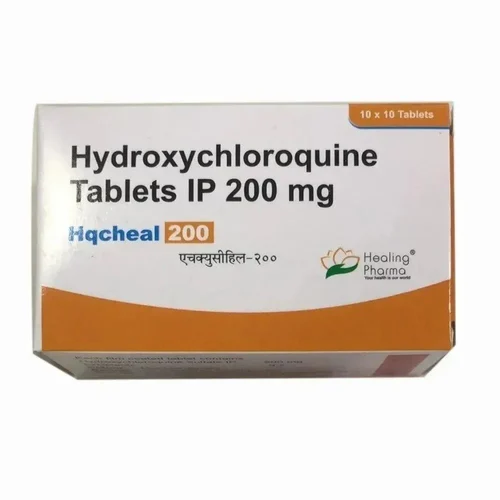“HQCHEAL 200 mg in Focus: A Clinical Overview for Patients and Providers”
What is HQCHEAL 200 mg?
HQCHEAL 200 mg is a prescription medication that contains Hydroxychloroquine Sulfate, a synthetic derivative of quinoline. It is widely recognized for its antimalarial, immunomodulatory, and anti-inflammatory properties. Originally developed to prevent and treat malaria, hydroxychloroquine is now frequently used in managing autoimmune diseases due to its ability to modulate the immune system.
Understanding HQCHEAL 200 mg: An Overview
- Active compound: Hydroxychloroquine Sulfate, yielding 155 mg base.
- Common Uses: Malaria prevention/treatment, Rheumatoid Arthritis, Systemic Lupus Erythematosus (SLE), and other autoimmune diseases.
- Form: Oral tablets, 200 mg strength
- Prescription-only: Yes
Medical Uses and Applications of HQCHEAL 200 mg
HQCHEAL 200 mg is a prescription medication containing Hydroxychloroquine Sulfate, primarily used as an antimalarial and disease-modifying antirheumatic drug (DMARD). It has anti-inflammatory and immunomodulatory effects, making it useful in various autoimmune and inflammatory conditions.
1. Antimalarial Use
Malaria Prophylaxis (Prevention)
- Indication: Prevention of malaria in travelers to regions where Plasmodium vivax, P. ovale, P. malariae, and P. falciparum are sensitive to hydroxychloroquine.
- Dosing: 400 mg once weekly
- Start: 1–2 weeks before entering the endemic area
- Continue: Weekly during stay and for 4 weeks after departure
Treatment of Malaria
- Effective against non-resistant strains of P. falciparum and other species
- Regimen:
- Administer an 800 mg loading dose, followed by 400 mg at the 6th, 24th, and 48th hour, totaling 2000 mg.
Note: Not effective in areas with high chloroquine resistance; alternatives like artemisinin-based therapies may be preferred.
2. Autoimmune and Inflammatory Diseases
Rheumatoid Arthritis (RA)
- Used as a disease-modifying antirheumatic drug (DMARD)
- Mechanism: Reduces inflammation and slows joint damage by modulating immune response
- Benefits:
- Decreases joint pain, swelling, and stiffness
- Improves physical function and quality of life
· Commonly prescribed as monotherapy or alongside methotrexate or sulfasalazine.
Systemic Lupus Erythematosus (SLE)
- Considered a first-line long-term treatment
- Benefits include:
- Reducing flares and disease activity
- Protecting against organ damage
- Lowering mortality in lupus patients
- Mechanism: Suppresses immune overactivity and cytokine production
Discoid and Cutaneous Lupus Erythematosus
- Used to treat skin manifestations of lupus (e.g., photosensitivity, rashes)
- Results in improved skin appearance and reduced flare-ups
3.Dermatological Applications
Used off-label for skin conditions with autoimmune or inflammatory bases, including:
- Lichen Planus
- Polymorphous Light Eruption (PMLE)
- Sarcoidosis (cutaneous)
- Porphyria Cutanea Tarda – inhibits porphyrin synthesis
4.COVID-19 and Viral Infections (NOT currently recommended)
Hydroxychloroquine was investigated early in the COVID-19 pandemic due to its antiviral and anti-inflammatory properties, but clinical trials did not confirm efficacy, and it is no longer recommended for treatment or prevention.
5. Experimental Uses and Research Applications
Hydroxychloroquine is under ongoing research for its potential role in:
- Cancer Therapy: Investigated for disrupting autophagy in certain tumors (e.g., glioblastoma, pancreatic cancer)
- Type 2 Diabetes: Studied for effects on insulin sensitivity and blood glucose control
- Post-viral syndromes: Investigational use in chronic fatigue or inflammatory conditions
Administration and Dosage Guidelines
Condition-Specific Dosing Guidelines
1. Rheumatoid Arthritis (RA)
- Starting dosage: 400 to 600 mg per day, typically split into two 200–300 mg doses.
- Onset of Action: May take 4–6 weeks for effects; full benefit may take up to 6 months
- Monitoring: Regular eye exams (retinal screening) after 5 years or earlier in high-risk patients
2. Systemic Lupus Erythematosus (SLE)
- Typical Dose: 200–400 mg/day
- May be given once or divided into two doses depending on patient tolerance
- Long-term use is common to control disease flares
3. Malaria (Prophylaxis and Treatment)
- Prophylaxis:
- Dose: 400 mg once weekly
- Start: 1–2 weeks before exposure
- Continue: Throughout exposure and for 4 weeks after leaving the endemic area
- Treatment (Acute Attack):
- Day 1: 800 mg initial dose, followed by 400 mg at 6 hours
- Days 2 & 3: 400 mg once daily
4. Other Off-Label Uses (Dosage varies; must be guided by physician)
- Sjogren’s syndrome, dermatomyositis, sarcoidosis, and COVID-19 (not routinely recommended) — doses usually align with autoimmune dosing range of 200–400 mg/day
Special Populations
Pediatric Use
- Used cautiously under specialist supervision, mostly for juvenile idiopathic arthritis or lupus
- Dose: Based on body weight (e.g., 6.5 mg/kg/day of base, equivalent to ~8 mg/kg/day of sulfate)
- Max dose: Typically not exceeding adult doses
Elderly Patients
- Start at the lower end of dosing range
- Monitor for vision changes and renal function
Patients with Renal or Hepatic Impairment
- Use with caution
- May require dose adjustment or increased monitoring
- Blood tests to monitor liver enzymes and kidney function are often recommended
Storage and Handling
- Store tablets at room temperature (20°C–25°C / 68°F–77°F)
- Keep away from moisture, heat, and direct sunlight
- Do not use expired medication
- Store in original packaging and ensure it’s kept away from children and domestic animals.
Safety Profile and Considerations
HQCHEAL 200 mg, containing Hydroxychloroquine Sulfate, is generally well-tolerated when used as prescribed, but it is associated with important risks, especially during long-term use. Safety must be closely monitored through regular medical follow-up and appropriate screening (e.g., eye exams, blood work).
Common Side Effects
Usually mild in nature, these effects often diminish as your body adjusts to the medication:
| System | Side Effect | Notes |
| Gastrointestinal | Nausea, vomiting, diarrhea, abdominal cramps | Reduced by taking with food or milk |
| Nervous System | Headache, dizziness, fatigue | Usually temporary |
| Dermatologic | Rash, itching, skin pigmentation changes | Report persistent or severe skin reactions |
| Visual | Blurred vision, difficulty focusing | Often reversible if drug is stopped early |
Serious and Long-Term Risks
1. Retinopathy (Eye Toxicity)
- Most serious adverse effect of long-term hydroxychloroquine use
- Risk increases with:
- Use >5 years
- Daily doses >5 mg/kg of actual body weight
- Renal or liver impairment
- Elderly age or existing eye disease
- Early symptoms: Difficulty reading, visual distortion, color vision changes
- Screening:
- Baseline retinal exam within 1 year of starting
- Annual screening after 5 years (or sooner for high-risk patients)
2. Cardiotoxicity
- Rare but serious:
- QT interval prolongation (risk of arrhythmias)
- Cardiomyopathy
- Increased risk when used with other QT-prolonging drugs (e.g., azithromycin)
- Monitor: ECG and cardiac symptoms in high-risk patients
3. Hypoglycemia
- Can lower blood sugar, even in non-diabetics
- May enhance effects of insulin or oral antidiabetics
- Monitor for symptoms: dizziness, sweating, confusion, fainting
4. Neuropsychiatric Reactions
- Rare but reported: hallucinations, mood changes, agitation, suicidal thoughts
- Discontinue and seek medical help if these occur
5. Hematologic Effects
- Rare: Blood dyscrasias (e.g., anemia, leukopenia, thrombocytopenia)
- Monitor: CBC periodically if long-term therapy
6. Liver and Kidney Concerns
- Hydroxychloroquine undergoes partial metabolism in the liver and is eliminated through the kidneys.
- Impaired function in these organs may lead to drug accumulation and toxicity
- Regular monitoring of liver enzymes and renal function is recommended
Who Should Avoid HQCHEAL 200 mg?
Contraindications:
- Known allergy to hydroxychloroquine or related compounds (e.g., chloroquine)
- Pre-existing retinal or visual field abnormalities
- History of QT prolongation or serious cardiac rhythm disorders
Use with Caution In:
- Elderly patients (increased risk of eye and heart complications)
- Those with kidney or liver disease
- Patients with psoriasis or porphyria (can worsen these conditions)
- Individuals on QT-prolonging drugs, antidiabetics, or seizure medications
Drug Interactions
Hydroxychloroquine may interact with:
| Drug Class | Examples | Risk |
| QT-prolonging drugs | Azithromycin, amiodarone, haloperidol | Risk of arrhythmias |
| Antidiabetics | Metformin, insulin | Risk of low blood sugar |
| Antiepileptics | Phenytoin, carbamazepine | May reduce seizure threshold |
| Antacids | Magnesium/aluminum-based | May reduce absorption (space doses 4 hours apart) |
Pediatric and Pregnancy Considerations
- Pediatrics: Use with caution and under specialist supervision due to risk of overdose and retinal toxicity.
- Pregnancy: Considered relatively safe for autoimmune conditions (e.g., lupus), but must be used only under medical advice.
- Breastfeeding: Excreted in small amounts in breast milk; generally considered safe, but discuss with your doctor.
Patient Information and Support
Storage Instructions:
- Store between 20 and 25°C, away from dampness and direct light sources.
- Keep out of reach of children and pets.
Precautions:
- Regular eye exams recommended after 5 years of use or earlier if high risk.
- Inform your doctor of all current medications, especially:
- Antidiabetics (risk of hypoglycemia)
- Antiepileptics
- Cardiac medications (QT prolongation risk)
When to Contact a Doctor:
- Vision changes (blurred vision, halos)
- Irregular heartbeat
- Severe rash or itching
- Muscle weakness or fatigue
Research and Future Directions
Hydroxychloroquine has been the subject of ongoing research:
- Cancer Therapy: Investigated for its effect on autophagy and synergy with chemotherapy.
- COVID-19: Extensively studied but not recommended due to lack of proven benefit and potential for cardiac side effects.
- Autoimmune Innovation: New trials exploring its impact on other inflammatory diseases such as sarcoidosis, inflammatory myopathies, and more.
- Ophthalmic Safety: Advances in screening tools are improving early detection of retinal damage.
Conclusion
HQCHEAL 200 mg (Hydroxychloroquine Sulfate) is a versatile medication with significant therapeutic benefits for autoimmune and inflammatory conditions. While it is generally well-tolerated, careful adherence to dosage, routine monitoring (especially vision), and guidance from healthcare professionals is essential to ensure its safe and effective use.






David (verified owner) –
This supplement has been a great addition to my health routine. I feel stronger, more alert, and healthier overall. It’s improved my mental clarity and even helped with some minor aches and pains.
Matthew (verified owner) –
Supports overall wellness and mental clarity
Kai (verified owner) –
I’ve been using this supplement for a month now, and I can truly feel the difference. My energy levels have skyrocketed, and I feel more focused throughout the day. Definitely recommend for anyone looking to improve their overall health.
Max (verified owner) –
This medicine has helped me maintain balanced energy levels throughout the day. I feel more focused at work and less stressed. Plus, my digestion has improved significantly since I started taking it.